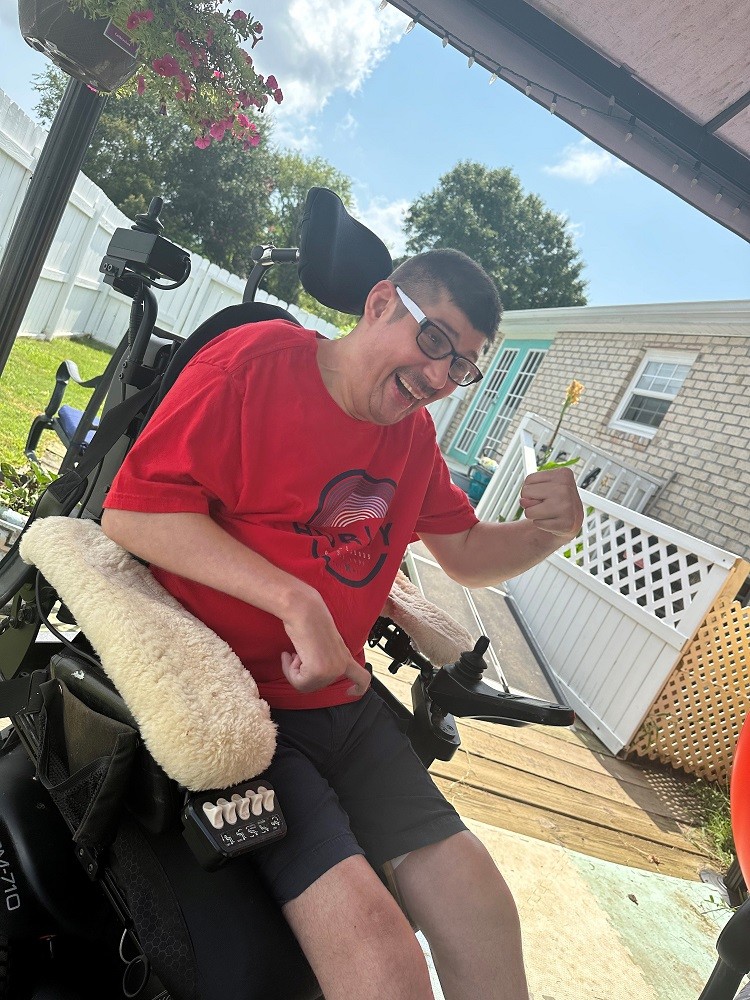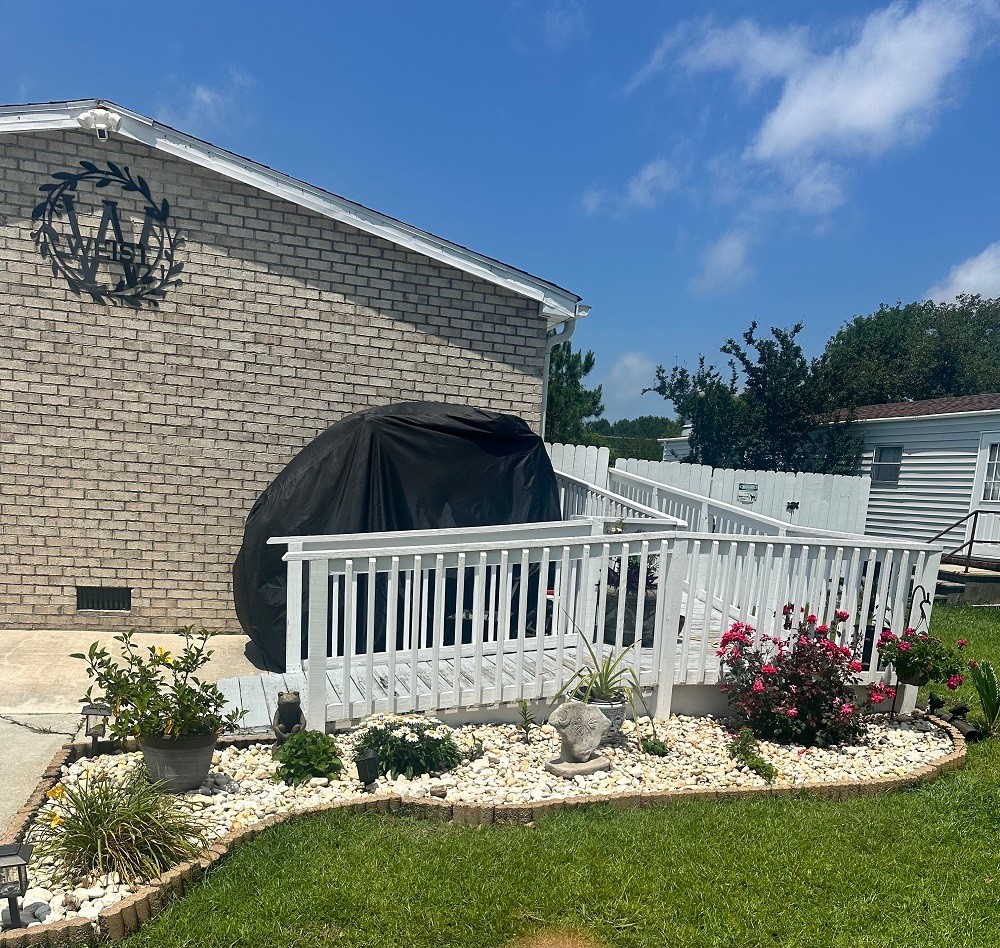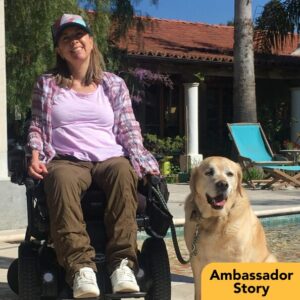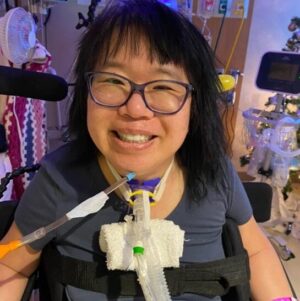41-year-old Gerald Avant is living with cerebral palsy and relies on his friend and caregiver Tammy Weist for mobility, wellness, and independence. He calls Tammy “Mom.”
Gerald is strong in his faith, a huge foodie, and an adventurous member of his community. With support from Tammy and the Help Hope Live campaign in his honor, Gerald hopes his future holds more adventures than ever—he is currently housebound without access to accessible transportation.
We asked Gerald and Tammy to let us into their unique world. Throughout our interview, he made Tammy, and us, laugh a lot with his jokes—even though, as he kept telling us, “It’s not THAT funny.”

Tammy, how long have you known Gerald, and how did he enter your life?
Gerald was 12 when I was doing home nursing. He became one of my clients.
I was more than his caregiver. We became family.
Gerald’s father used to tell me I was the best caregiver that Gerald had ever had.
The first time he came to stay with me, his father needed hernia surgery and had been putting it off because he was worried about Gerald’s care. I told him, I’ll take Gerald home with me for six weeks—don’t worry about it.
Gerald was 15 at that time.
He is 41 now, and he’s been living with me since 2017.

How did Gerald come to live with you?
Gerald’s father shared that he wanted me to become Gerald’s caregiver at my home when he passed away, but those wishes were not followed by the other people involved after his passing. As a result, Gerald ended up living in a nursing facility.
We were bringing him home to our house every weekend to spend time together.
One weekend, I noticed some marks on his shoulder. I knew Gerald wouldn’t answer the question “Who did this?,” so instead I just asked, “What happened here?” He said he didn’t know.
At the end of the night, he said, “Mom, do you want to know what happened?” One of his caregivers at the facility was pinching him and telling him not to tell or she’d do it again.
I reported it, and the caregiver was suspended for just three days. When she returned to work, I talked to Gerald’s family about finally bringing him home to live with me.
Did you have to make adjustments to your home and routine when Gerald moved in?
We widened the doorways for his wheelchair, added ramps, and put in a roll-in shower.

Gerald relies on me for care, and without accessible transportation, he can’t come with me when I leave the house. For that reason, I don’t go anywhere anymore: I might get out of the house twice a month when I used to get out every day.
Even though there are a lot of challenges and limitations to our life, my heart would never let me put him back in a facility.
If we didn’t have this crazy sense of humor, I would be crying every day.
Gerald has a huge sense of humor. He says the same thing every single time I give him a glass of water: “Yuck!”
I shoot back to him, “Did I ask if you liked it?”
I love the feeling of being needed, and I know Gerald needs me.
Tell me about Gerald’s personality.
Gerald doesn’t know he’s disabled and doesn’t see himself that way. His father raised him to see himself as no different from anyone else.
There are so many subtleties to how he communicates. I know if he can hardly talk, something is bothering him, and I talk with him to find out what’s wrong.
It hurts him, the things that have happened to him, and he will talk to me about it. But then we’ll play loud music and I’ll bounce around the house like an idiot.
I’ve always loved children, and if I have to act like a fool to make a kid or Gerald have a good day, I’ll do it.
You have to get down to a kid’s level sometimes to connect with them, and it’s the same with Gerald. I’ll act like a silly goose.
My husband hates loud music, so we only play it when he’s not home! Gerald’s elbows don’t move, but he will move his arms to music.
Why is this fundraising campaign in Gerald’s honor so important?
It makes Gerald excited and happy to be able to go somewhere—to have plans for the day to go out and do. It just makes him excited to get out of the house. Anybody would go crazy sitting in a house all the time.
I don’t want his spirit to start going down because he’s always home. He used to be a closer part of his community when we could travel to church and church events.
He also needs physical therapy to keep up his health, but right now, it’s too hard for us to get there without an accessible vehicle.
I want to do the right thing for him, and that’s why fundraising is so important right now.
What does the word “hope” mean to you?
Hope means simply putting our story out there and believing everything will work out for the best for Gerald.

Gerald, what does mobility mean to you?
If nobody moves me, I’d be in the bed. Very important to me.
What are some of your favorite hobbies?
Jesus, a couple of movies I like to watch, and eating Mom out of house and home. Oatmeal is one of my favorite foods.
For dessert, I like ice cream sandwiches, strawberry shortcake, and peanut butter, but Mom hates peanut butter.
My order from Burger King is a big Whopper and a milkshake.
What are some of your goals for the future?
Get a vehicle. Go to the movies, see my brothers. Go on road trips and see concerts.
Right now, I am stuck in the house.
What does the word “hope” mean to you?
Hope in God. God is everything. He’s my Father, for God’s sake. I love Jesus. I say a blessing before I put any food in my mouth.
I wish more people believed in hope.
Follow Gerald and Tammy’s life on Facebook and make a donation in Gerald’s honor at helphopelive.org.











